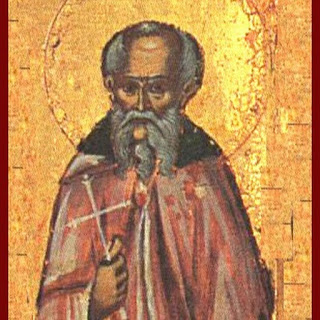St. Melito of Sardis - On the Passover #1.
St. Melito, Bishop of Sardis (in today’s Turkey, about 50 miles NW of Ephesus) was born and raised Jewish, later converting to Christianity (we don’t know when or how). He was a follower of St. John the Evangelist, and likely also knew St. Polycarp and St. Ireneas of Lyons. Melito is reported to have been a bishop for 70 years, dying about 180 AD. There is a letter from 194 AD that speaks of Melito as one “whose whole walk was in the Holy Spirit.” He was considered a prophet in his time.
Long before Melito’s birth, Sardis had
become Hellenized (Greek) under Alexander the Great, and so he was a Church
Father who was completely at home in both Jewish and Greek cultures. He was the
first to establish the canon of Hebrew scriptures for Christians, giving it the
name “Old Testament.” While most of his extensive writings have been lost to
history, one was re-discovered in 1940, “On the Passover,” or “On Pascha,” probably
written around 167/168 AD. In this work, St. Melito’s gift of the Holy Spirit
is clearly seen in his illumination of how the Old Testament was fulfilled in
the New, and how the New Testament, in turn, illumined the Old. Indeed, he says
the Old Testament could not be fully understood until the time of the New Testament
made clear what God had been revealing in the Old all along.
So during this Easter Season, we might
reflect this teaching from one of the very early disciples of the Apostles who
can convey to us the understanding of the Apostolic Church about the Hebrew
Passover as fulfilled in the death and resurrection of Jesus Christ. St. Melito’s
“On the Passover,” is a homily delivered at the Easter Vigil Mass. St. Melito begins:
“First of all, the Scripture about the
Hebrew Exodus has been read and the words of the mystery have been explained as
to how the sheep was sacrificed and the people were saved.
“Therefore, understand this, O beloved:
The mystery of the Passover is new and old, eternal and temporal, corruptible
and incorruptible, mortal and immortal in this fashion:
“It is old insofar as it concerns the law,
but new insofar as it concerns the gospel; temporal insofar as it concerns the
type, eternal because of grace; corruptible because of the sacrifice of the
sheep, incorruptible because of the life of the Lord; mortal because of his
burial in the earth, immortal because of his resurrection from the dead.
“The law is old, but the gospel is new;
the type was for a time, but grace is forever. The sheep was corruptible, but
the Lord is incorruptible, who was crushed as a lamb, but who was resurrected
as God. For although he was led to sacrifice as a sheep, yet he was not a
sheep; and although he was as a lamb without voice, yet indeed he was not a
lamb. The one was the model; the other was found to be the finished product.
“For God replaced the lamb, and a man the
sheep; but in the man was Christ, who contains all things.
“Hence, the sacrifice of the sheep, and
the sending of the lamb to slaughter, and the writing of the law – each led to
and issued in Christ, for whose sake everything happened in the ancient law,
and even more so in the new gospel.
“For indeed the law issued in the gospel –
the old in the new, both coming forth together from Zion and Jerusalem; and the
commandment issued in grace, and the type in the finished product, and the lamb
in the Son, and the sheep in a man, and the man in God.
“For the one who was born as Son, and led
to slaughter as a lamb, and sacrificed as a sheep, and buried as a man, rose up
from the dead as God, since he is by nature both God and man.
“He is everything: in that he judges he is
law, in that he teaches he is gospel, in that he saves he is grace, in that he
begets he is Father, in that he is begotten he is Son, in that he suffers he is
sheep, in that he is buried he is man,
in that he comes to life again he is God.
“Such is Jesus Christ, to whom be the glory forever. Amen.”
Dibby Allan Green has a BA in Religious Studies (Westmont College, 1978) and MA in Theology (Augustine Institute, 2019), is a lay Catholic hermit, and a parishioner of Our Lady of Lourdes Parish.

